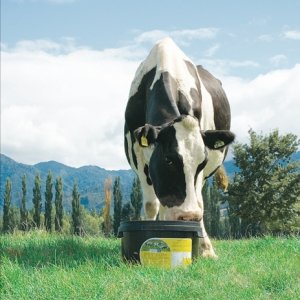Farm nutrient company, Altum is encouraging dairy farmers to challenge their traditional dry cow management systems in preparation this winter.
The advice comes on the back of a recent independent trial on the effects of the magnesium and micro-nutrient enriched crystalline molasses block Crystalyx Dry Cow on the dairy cow transitioning from calving to lactation.
New Zealand expert in ruminant physiology and reproductive biology, Dr Mark Oliver, Liggins Institute, University of Auckland, says the trial demonstrated that Crystalyx Dry Cow provided benefits above those delivered by traditional mineral supplementation.
These include lower rates of mastitis and reductions in retained placentas, along with an added benefit of a lighter workload for farm staff.
"Farm staff appreciated the comparative practicality of the molasses block and its performance in poor weather compared to more traditional systems which use dusting or water trough dosing. Anecdotally, there was a perception that cow mood and ease of handling was also superior in the Crystalyx supplemented herd. These preliminary studies suggest that Dry Cow is suitable for use on New Zealand farms representative of the one used in the trial."
The trial, overseen by Oliver was carried out on a commercial Tokoroa dairy farm operating two herds on adjacent properties. It was undertaken for Altum, who exclusively distributes the Crystalyx range of dehydrated molasses blocks in New Zealand.
Altum animal nutrition manager, Jackie Aveling, explains that calving and the start of lactation is a time of extreme metabolic stress for dairy cows.
"Energy deficits occur, but more commonly the demand for key minerals often outstrips supply especially in the case of magnesium, which is a factor in maintaining blood calcium levels and in the prevention of milk fever.
"A common strategy to avoid this problem is to supplement pregnant cows 6 to 8 weeks before calving with magnesium and other micro-nutrients. Usually, this involves dusting of supplementary feed or trough treatment.
"While overseas trials have shown us the benefits of using Crystalyx, we have trial work here in New Zealand which validates its use domestically."
During the trial cows in the control herd were supplemented with magnesium and micro-nutrients using traditional methods while the other herd was supplemented with access to Crystalyx Dry Cow two months before projected calving. Observations on common metabolic and post calving complications were made on 210 cows from the control group and 156 cows from the Crystalyx supplemented group.
As part of an agreed health monitoring programme veterinarians conducted blood sampling on a subset of cows from each group before supplementation began, five weeks after it started and five weeks later, at the trial's completion.
Crystalyx supplemented cows had an estimated uptake of 190g/day of Dry Cow.
Oliver reports that cases of treated milk fever were no different between the groups and did not exceed 7% of either herd.
"Similarly there was no significant difference in observed cases of assisted delivery or inductions between groups. However in control cows, incidence of retained placentas was 11% compared to 2.6% in the Crystalyx supplemented group while mastitis incidence also tended to be higher at 9 % in the control herd versus 3.9% in the cows provided with Crystalyx.
"In this particular trial, supplementation by either method resulted in suitable plasma concentrations of key nutrients in the vast majority of animals," says Oliver.
Aveling says that in addition to providing a simple and effective alternative to traditional mineral supplementation, other ruminant experts believe that Crystalyx Dry Cow can play a role in correct management of the dry cow period in preparation for the next season, assisting to maintain good body condition scores and keeping the rumen in good health.
"This was confirmed at an international conference on rumen function in Germany last year by Professor Jim Drouillard, Kansas State University."
















